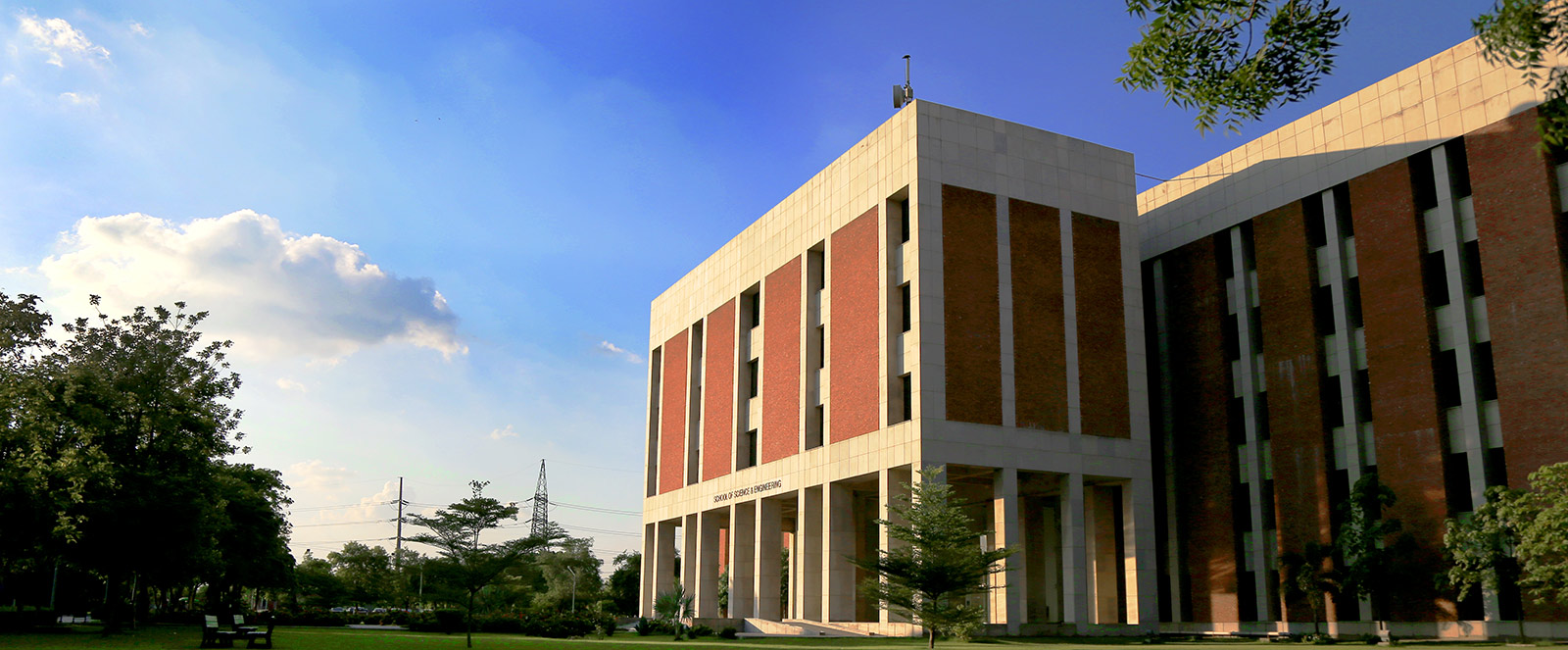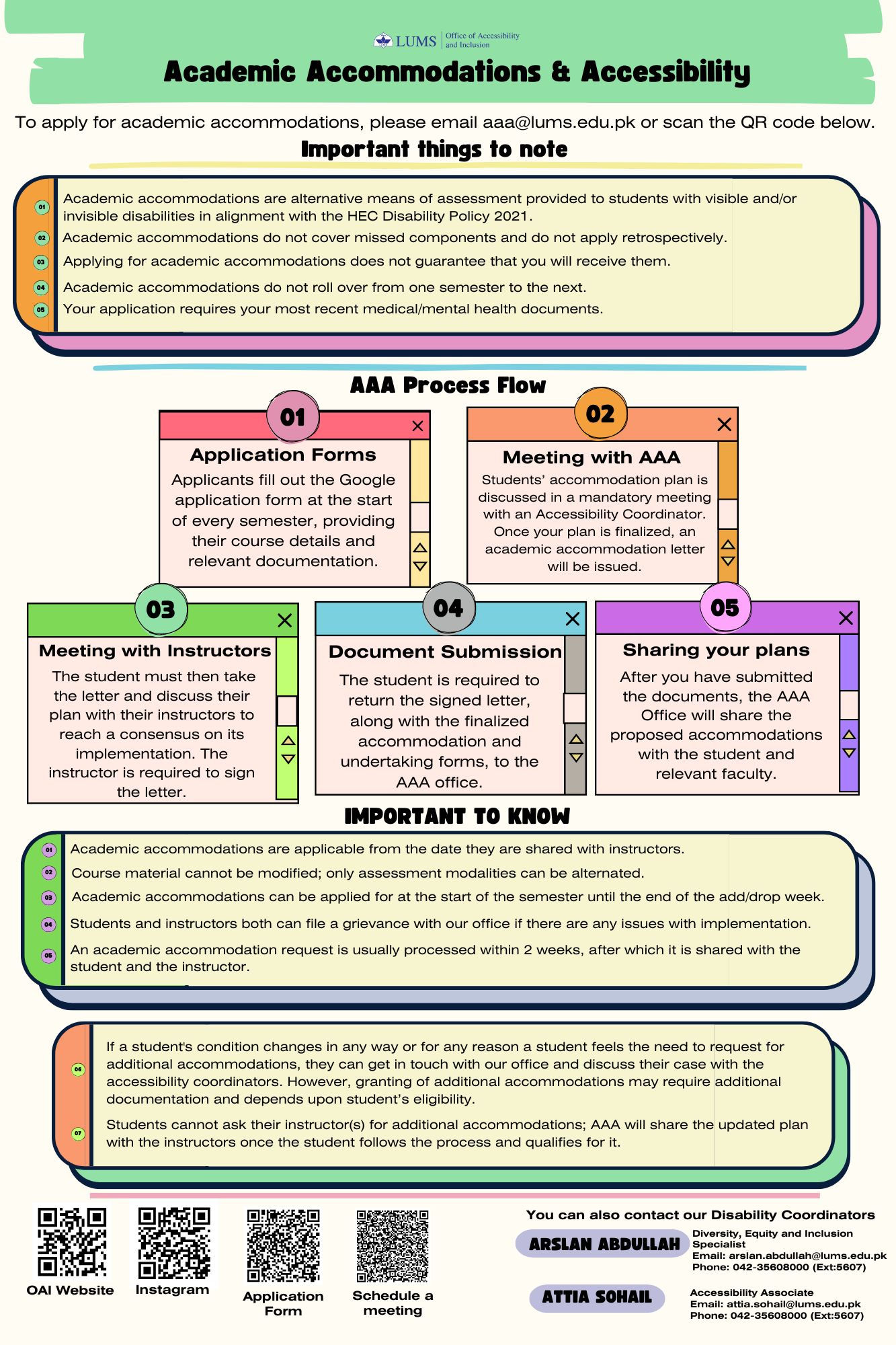Accessibility

Accessibility refers to creating and designing social systems to increase access and reach for people from all levels of society, with diverse abilities. It stands for creating an environment where people with or without physical, mental, and emotional disabilities integrate and actively engage without barriers, physical or otherwise.
Through the Office of Accessibility and Inclusion (OAI), LUMS provides holistic support to ensure that all students, regardless of visible or invisible disabilities, functional or cognitive challenges, can excel academically and fully participate in their educational journey with equal opportunity. Our support is designed to address the diverse needs of students, offering academic accommodations with alternate assessment modalities or the course components, and access to assistive resources tailored to individual requirements. We also support accessibility through campus facilities such as priority hostel accommodations and parking spaces close to campus buildings and examination halls. By combining academic adjustments with physical and personalized support, we aim to create an inclusive and empowering environment where every student has the equal opportunity to excel.
The following is a list of possible accommodations, determined on a case-by-case basis.
Visual and Hearing Impairment Support
Tailored exam materials and resources, including:
Modified exam papers: Braille formats and large print options.
Assistive technologies: Screen readers like JAWS for visually impaired students.
Physical and Medical Accommodations
For students with functional or medical needs:
Supervised breaks: For students who need frequent pauses, such as walking breaks or time to use inhalers or medications.
Extended time: Extra time based on individual needs.
Physical assistance: Including help for students with hand injuries to write answers.
Special sitting arrangements: To accommodate medical conditions like epilepsy or physical discomfort.
Assistive devices: Use of computers, voice-to-text software, or adaptive technologies.
Campus Facilities
Accessible facilities: Including parking spaces close to campus buildings and examination halls.
Priority hostel accommodations: Accessible and proximity-based living arrangements for students with physical challenges.
* Please note that this list does not encompass all the accommodations or support services provided. Additional accommodations can be arranged based on individual student requests and documented needs.
Academic Accommodation Process
Academic accommodations are alternate means of assessment provided to students with visible and/or invisible disabilities in alignment with HEC Disability Policy 2021. These accommodations aim to ensure equitable access to academic success without altering the integrity of course content. To request academic accommodation, students are required to submit their most recent medical or mental health accommodation, which will form the basis for the process.
Upon submission, a discussion will be held with disability coordinator(s) to assess individual needs and determine reasonable alternate assessment modalities. It is important to note that course material cannot be modified; only assessment methods may be adjusted to suit specific requirements. Subject to the meeting and verification of documents, a tailored academic accommodations plan will be created ensuring that course learning outcomes are not compromised. Academic accommodations do not cover missed components of a course and cannot be applied retrospectively. Additionally, accommodations do not roll over automatically from one semester to the next; students must reapply to ensure their needs are met appropriately for each academic term.

Administrative Support During the Admissions Test/Process
LUMS follows a structured process to ensure accessibility and support for applicants with visible/invisible disabilities throughout the admissions process. The admission application forms include a dedicated section titled "Special Accommodations" where applicants can provide information about their disability and specify any accommodation requests related to admission test(s) or other aspects of the application. While a Disability Certificate is not a mandatory requirement, applicants are required to provide attested medical documents to help us better understand their needs.
To further support, prospective applicants can reach out to the Admissions Office through multiple communication channels, including phone, webchat, email, a dedicated helpdesk, and in-person consultations. Additionally, our Open House, organized by the Office of Advancement, provides an excellent opportunity for applicants and their families to engage directly with our team and discuss any specific requirements.
Our admissions process is centered around merit-based evaluation, ensuring there is no discrimination based on disability. Once a request for special accommodations is received, dedicated members of the relevant office(s), in collaboration with the Office of Accessibility and Inclusion (OAI), work closely with the applicant to provide necessary assistance. Moreover, all information regarding an applicant's disability is handled with confidentiality and shared only with relevant individuals on a need-to-know basis.
Upon admission, the Admissions Office communicates the student's specific accommodation needs to the relevant stakeholders to ensure they are well-equipped to offer continuous support. Additionally, Disability Coordinators are available as contact points for any further assistance students may need. This process embodies our commitment to equal opportunities and our dedication to supporting students with special accommodations on their educational journey at LUMS.
